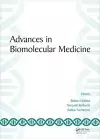
Advances in Biomolecular Medicine
3 contributors - Hardback
£190.00
Prof. Robert Hofstra studied biology and received a PhD in the medical faculty at the University of Groningen in 1995 for his studies on the involvement of the RET gene in the cancer syndrome MEN2. He worked in the laboratories of Prof. Romeo (Genoa, Italy) to map and characterize the RET gene. After a short postdoctoral appointment he became head of the DNA diagnostic laboratory in 1996 at the Department of Medical Genetics of the UMC Groningen. In 2000 he became head of the Research and Development group at the Department of Medical Genetics, and in 2005 he was appointed as professor of Human Developmental Genetics. In 2012 he accepted an appointment as chair of the Department of Clinical Genetics at the Erasmus MC. His main research objectives over the years were, and still are, to identify and characterize genes and mutations in genes contributing to inherited diseases and cancer and to understand how these mutant genes contribute to disease development. Most of the work in his group is focused on Hirschsprung Disease and Congenital Short Bowel Syndrome. Prof. Noriyuki Koibuchi obtained his M.D. and Ph.D, at Gunma University, Japan. He worked as a postdoctoral fellow in the Department of Neurobiology and Behavior at Rockefeller University, and became the Assistant Professor of Physiology at Dokkyo University School of Medicine, Japan. He became a Visiting Assistant Professor of Medicine in the Division of Genetics at Brigham and Women’s Hospital and Harvard Medical School and was appointed to be Professor and Director for the Department of Integrative Physiology at Gunma University Graduate School of Medicine. Dr. Koibuchi’s area of expertise and main interest concern the molecular mechanisms of thyroid hormone action in the central nervous system. He is a member of the Endocrine Society, Society for Neuroscience, and Society of Toxicology. Prof. Suthat Fucharoen is a professor at the Institute of Science and Technology for Research and Development, Mahidol University, Thailand. He has conducting research on thalassemia for many years, and his findings provide insights into different types of genetic abnormality that lead to thalassemia in Thai population. He also developed methods in diagnosis of fetal abnormality, which could be carried out through diagnosis of genetic abnormality during the antenatal care. It became a novel approach to control and prevent newborn thalassemic patient in Thailand. Suthat also studied the interaction of genetic defect and the different degree of disease severity, and the pathophysiology of iron deficiency as well as the benefits of using iron chelating agents. He collaborated with both domestic and foreign organizations in creating the thalassemia research network.